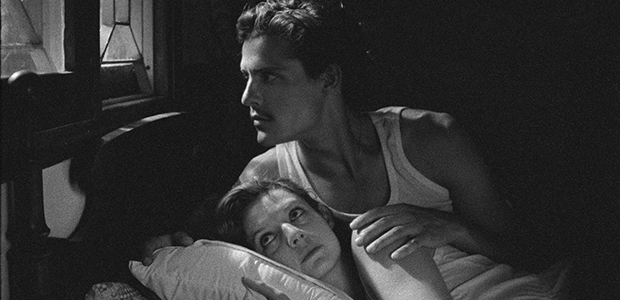
Tabu presents the life of a single woman in two distinct times and in two utterly distinct ways as a treatise on memory and time and how both are linked together by people. A complex but gratifying film for the patient viewer unafraid of experiments in cinematic form and presentation, the reward for watching Tabu to its completion is ultimately well worth the endurance.
As is the case with films of this nature, Tabu can’t be described, only experienced. It doesn’t even open with much coherence, featuring a cryptic prologue where a man in some timeless period is tormented by visions of his dead lover until he decides to end his life. We then segue into present day Lisbon, in a section entitled ‘Lost Paradise’ about 3 women—an octogenarian named Aurora, her African helper Santa and their neighbour Pilar who is always trying to help Aurora cope with her declining health and the possible onslaught of senility. Aurora is a compulsive gambler who spends time at the local casino, losing all her money. Always accusing her helper of practicing voodoo magic against her, one day her health deteriorates considerably and she finds herself on her death bed, where she asks Pilar to seek an old friend of hers, a man named Gian Luca.
This is where the second half of the film, set in Africa and simply entitled ‘Paradise’, commences, taking Tabu into a completely different realm. Narrated in great depth by Gian Luca, there are absolutely no dialogues in this section, though we hear every sound there is and can see the characters speaking. As surreal as the effect of this is, it is heightened by the dreamy, moody feel of this pivotal moment from Aurora’s past where her image in our mind as the old senile woman alters into that of a person who lived a life of privilege, love and yearning that resulted in a tragic loss. Under director Miguel Gomes’ watchful, penetrating eye, TABU transforms from being a film that at first seemed to be made with an absurdly peculiar style into something much more profound; a story that makes us see differently the life of a character we had already pre-judged, because of what we learn about her. It isn’t just what happens during this section, which like an enchanting story is full of heartache and pain that feels relatable, real and like the most monumental thing in the world, but how you feel drawn into the story being narrated, month after month after month, and where it might be headed.
There is something to be said about Tabu as a whole because of what this technique does to the film. Considering how consistent in tone and utterly beautiful to behold the second half of this black and white film is, it becomes obvious that the distinctly incongruous tone of the first half and its drab monotone imagery was a conscious construct on the part of Gomes who clearly wanted to distinguish between the two. The only rational reason for this seems to be to allow us to develop a sense of empathy and understanding about a character by seeing their life twice and viewing the world as they had inhabited it, making us feel involved, first in her death and then when we think we knew her, by going back into her past and retelling an incredible, grand, mysterious and downright sensual tale about her. Like Uncle Boonmee, the intrigue of the past becomes the films overriding sensation until, right at the end, we are left with an ache that feels powerful and overriding.
Rating: 



